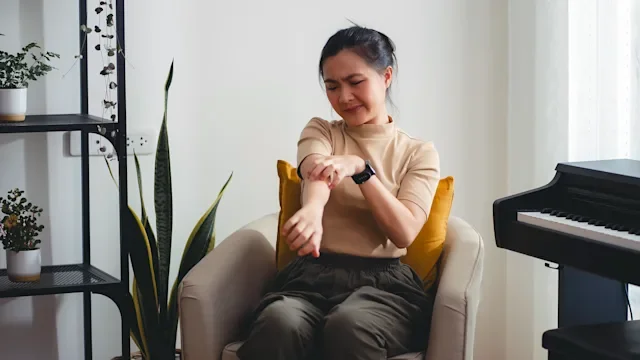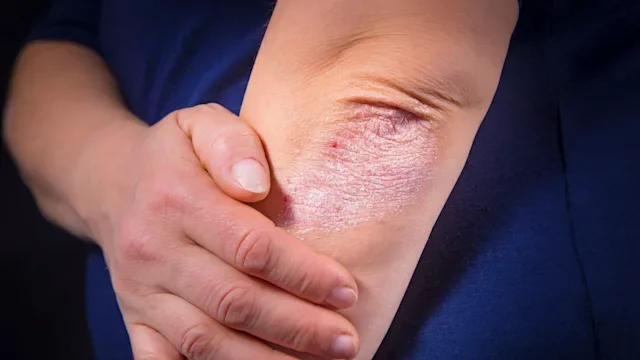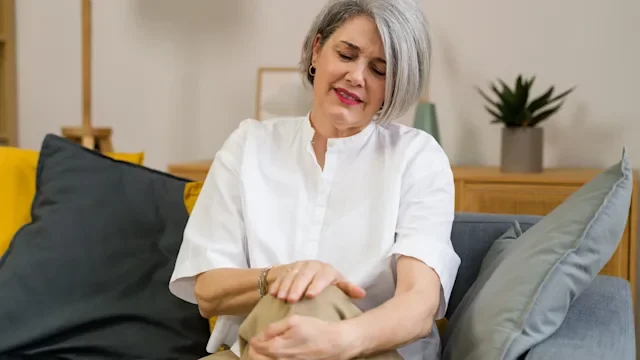Key takeaways:
Self-care won’t make your psoriasis symptoms go away. But it may bring a little relief and prevent flares from getting worse.
Consider psoriasis self-care tips like taking shorter showers, using moisturizer when you feel itchy, and getting a handle on your stress levels.
It can also help to identify what causes your psoriasis to flare. Common triggers include skin injuries, certain medications, alcohol, and smoking.
If you live with psoriasis, you probably know that its symptoms can come and go. Like other autoimmune conditions, psoriasis can flare, leading to an outbreak of those itchy skin rashes and related symptoms.
Keeping up with your psoriasis treatment is one important way to manage flares. But what else can you do to help take care of yourself when you’re experiencing increased symptoms? Here are some self-care tips for psoriasis.
At-home psoriasis self-care tips to manage flare-ups
Psoriasis can lead to a number of uncomfortable symptoms. And while self-care isn’t going to make those symptoms go away, it can give you a little relief. Below are 11 self-care tips for psoriasis you can try at home.
1. Get plenty of light
Exposure to sunlight can be beneficial for your symptoms. Certain ultraviolet (UV) rays help slow down fast-growing skin cells that lead to psoriasis symptoms. UV light may also reduce itching and skin inflammation.
But you don’t want to get a sunburn, so be mindful of your time in direct sunlight and wear sunscreen. In addition, spending extra time outdoors may not be right for you if certain temperatures trigger psoriasis symptoms.
As an alternative or addition to sunlight exposure, ask your dermatologist about light therapy (phototherapy). Dermatologists will often prescribe light therapy as one aspect of a psoriasis treatment plan.
2. Limit your shower length
A nice warm shower or bath can feel incredibly soothing. Just keep in mind the water temperature and the length of time you spend in the shower. Hot water and long showers or baths can further dry out your skin, making your psoriasis symptoms worse.
Keep showers to 5 minutes or less, and don’t take baths longer than 15 minutes. Don’t take more than one shower per day, and don’t forget to use moisturizing skincare products made for sensitive skin.
3. Be gentle with your hair
Whether you have scalp psoriasis or not, it’s a good idea to be gentle with your hair. This will help ensure you don’t injure your skin or make symptoms worse.
- PrednisoneGeneric Deltasone and Rayos and Sterapred
- MedrolMethylprednisolone
- Fluticasone PropionateGeneric Cutivate and Flonase
Good psoriasis self-care tips for hair include:
Gently brushing and combing your hair, taking care not to scrape the comb or brush against your scalp
Sticking with loose hair styles, which prevents pulling on and irritating the scalp
Being mindful when using hot curling or straightening irons so you don’t burn your scalp
Shampooing your hair and scalp very gently to avoid irritating your scalp
A dermatologist will be able to recommend the best natural hair products to take care of Black hairstyles, too.
4. Avoid special hair treatments
It can be nice to indulge in a new hairdo, with special treatments like hair dye, relaxers, perms, or blowouts. But during a psoriasis flare, the American Academy of Dermatology (AAD) recommends skipping these kinds of hair treatments altogether.
Outside of a flare, check with your dermatologist about best practices for hair treatments that may affect your scalp. Your provider can help you understand the risks and safety precautions you may be able to take at your hair appointment.
5. Moisturize — often
Start early and moisturize, moisturize, moisturize throughout the day. Not only does moisturizer help your skin heal and reduce redness, it can also help cut down on the itch.
In fact, when you feel the urge to scratch an itch, try moisturizing the area instead. Moisturizer may even help mask the appearance of scales.
6. Try a damp cloth for itch relief
Psoriasis can be itchy, and a damp cloth is another way to get some relief without harming your skin. Use cool water on a soft towel and gently apply the towel to itchy areas.
According to the AAD, the nerves that tell your brain you’re itchy don’t signal as well when they’re cold.
7. Protect your hands
Don’t forget to wear gloves and protect your hands when using them for certain tasks. Activities like gardening or washing the dishes can expose you to injuries or temperatures that can trigger a flare.
You may want to try wearing vinyl or nitrile gloves over top of cotton gloves for the best results. Latex gloves won’t offer your hands enough protection. And the layer of cotton may help avoid scratching against existing rashes on your hands or nails while doing chores.
8. Leave your nails alone
Biting or picking at your nails and cuticles may be a common habit when you’re bored or nervous. But it’s best to leave your nails and the skin around them alone if you have psoriasis. It’s too easy to injure your cuticles or nails or get an infection that can trigger a psoriasis flare.
And, while it may be disappointing, it’s probably best to skip artificial nails, too. This is especially true if you have nail psoriasis. Artificial nails increase the chances your nail will separate from your finger. Stick to simple nail buffing and polishing when you fancy a change of color or pattern.
9. Get enough sleep
Living with a chronic illness like psoriasis can sometimes make covering your basics, like sleep, a little more difficult. But an important part of self-care, including when you have psoriasis, is getting enough sleep.
Aim to get 7 to 9 hours of sleep each night. If you’re having trouble sleeping due to your psoriasis symptoms, talk to your healthcare provider. They may be able to help you address symptoms that can keep you awake, like itchiness. And don’t forget to moisturize before you go to bed.
10. Limit your alcohol use
If you have psoriasis, it’s best to stop drinking alcohol. Not only can alcohol cause flares, but some psoriasis treatments won’t work as well if you drink too much. And some psoriasis medications — like methotrexate (Rheumatrex) — may not be safe to take at all if you keep drinking.
If you don’t want to stop drinking completely, limit how much alcohol you drink. The AAD recommends not drinking more than one drink a day for women and no more than two drinks a day for men.
11. Manage your stress levels
While stress can have a negative impact on anyone, if you have psoriasis, stress can lead to flares and more symptoms. So work to limit your stress levels as much as possible.
You can lower your stress by practicing calming activities like:
And don’t be shy about reaching out for help from a mental health therapist. They can help you learn new skills to deal with stress. They can also help you address issues in your life that regularly stress you out.
To find a therapist, look for a provider who accepts your insurance if you have coverage. You can also ask friends or family for a recommendation. Plus, you can search online for a therapist who specializes in chronic illness using databases like Psychology Today.
What makes psoriasis worse?
Recognizing what triggers your psoriasis can be another way to take care of yourself and manage your condition.
The following are common psoriasis flare triggers:
Skin injuries such as sunburn, bug bites, cuts, scratches, and even tattoos or piercings
Drinking too much alcohol
Smoking
Dry conditions, whether outside or inside with air conditioning
Cold temperatures
Infections, like an earache, a sinus infection, the flu, or strep throat
Certain medications, including beta blockers, lithium, or nonsteroidal anti-inflammatory drugs (NSAIDs)
When to see your healthcare provider about a psoriasis flare
It may be time to visit your provider or dermatologist about a psoriasis flare if:
You’ve noticed a change in your symptoms.
Your usual treatments aren’t working.
You’re hoping to get advice or new ideas for a specific issue, like sleep or stress management.
You have questions about your condition or how best to manage it.
Your provider can help you find the best way to cope with your psoriasis symptoms, even in a flare.
The bottom line
Self-care won’t eliminate psoriasis symptoms. But it can help you manage your symptoms and get a little relief. To practice psoriasis self-care, consider things like limiting how long you spend in the shower, being mindful about hair care, limiting your alcohol use, and lowering your stress levels. As a bonus, many of these self-care practices can also help you avoid triggers that may lead to a psoriasis flare.

Why trust our experts?


References
American Academy of Dermatology. (n.d.). 7 nail-care tips that can reduce nail psoriasis.
American Academy of Dermatology. (n.d.). 7 ways to relieve itchy psoriasis.
American Academy of Dermatology. (n.d.). 8 ways to stop baths and showers from worsening your psoriasis.
American Academy of Dermatology. (n.d.). Are triggers causing your psoriasis flare-ups?
American Academy of Dermatology. (n.d.). Can stress worsen psoriasis?
American Academy of Dermatology. (n.d.). Hair styling tips that can reduce flares of scalp psoriasis.
American Academy of Dermatology. (n.d.). Healthy diet and other lifestyle changes that can improve psoriasis.
American Academy of Dermatology. (n.d.). How can an African American woman treat scalp psoriasis?
American Academy of Dermatology. (n.d.). How should I remove psoriasis scale?
American Academy of Dermatology. (n.d.). Psoriasis treatment: Phototherapy.
American Academy of Dermatology. (n.d.). Psoriasis: Tips for managing.
American Academy of Dermatology. (n.d.). Scalp psoriasis: Shampoos, scale softeners, and other treatments.
Hirshkowitz, M., et al. (2015). National Sleep Foundation’s sleep time duration recommendations: Methodology and results summary. Sleep Health.
Nair, P. A., et al. (2023). Psoriasis. StatPearls.
National Psoriasis Foundation. (2022). Phototherapy.












